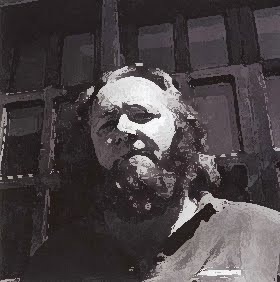It's Too Hot
Ted Berrigan

Ted Berrigan on the radio: "In the American Tree: New Writing by Poets," originally broadcast on Berkeley’s KPFA-FM and hosted by Lyn Hejinian and Kit Robinson, August 11, 1978. In this excerpt of a transcription made recently by Michael Nardone for Jacket2, we join the three about 10 minutes into the show:
BERRIGAN: You just mentioned the secret actually of all my entire poetry, which is that it has to do with planes of reality, of perception. Not of reality, because that sounds theoretical, but with planes of being coming not in a theoretical sense but in a sense of trying to get accurate. I am talking to you but he is thinking about it while I am talking.
ROBINSON: And they, they said something about this, too. And other peoples’ voices come into your work.
BERRIGAN: They are over there, though, and I is here. And he is a little bit over there but is near.
ROBINSON: So there’s an incredible sense of location.
BERRIGAN: Yeah.
ROBINSON: Like when you say three hundred and sixty degrees, you get a center.
BERRIGAN: Right.
ROBINSON: And you get a circumference, and a point of the center.
BERRIGAN: There’s something feminine if you can actually get three hundred and sixty degrees, which I didn’t realize, I suppose, until a few months ago that you could have planes and still have a circle, which is a really nice idea.
HEJINIAN: Right.
BERRIGAN: All that sounds so abstract, and it’s not abstract when I’m doing it. It’s simply trying to have something exist without describing it. To name its parts rather than describe it. Description is slow. I can’t keep up to the pace of my metabolism when I am using description usually. But I can do it while simply naming things. You know I don’t use images much but I will name an image. I mean I will say a tree. I don’t try to make a picture of a tree for you. I assume—
HEJINIAN: What about in your novel, in Clear the Range?
BERRIGAN: What about it? I mean, that’s another story entirely. I mean that’s a poet’s novel. I wrote it as this poem, was writing it. It’s a genre work, a genre which I was thoroughly familiar with, the Western novel. And I used the genre then to make everything be very slow and to make this setting in which there was a hero and a villain. Almost like Commedia del Arte. Then there was a girl. And then there were various other characters, including a horse and a mule. But, I mean, the main thing that was going on was that the villain and the hero were constantly having these Western confrontations, in which they didn’t finally pull out their guns and shoot each other. And they were very similar sort of, except that the villain was obviously villainous, and the hero was obviously the hero. Anytime one of them did anything like go into a restaurant or a bar, then the other one was a waiter or the bartender, and they had these confrontations every minute. I think I thought I was making something similar to Camus’ book The Stranger, in which the guy, Meursault, the hero, walks around and becomes totally bemused by the sun smashing on his brain every minute and he ends up, it seems, that he killed somebody. He doesn’t quite remember, or he does remember but he doesn’t know why he did it or any thing in particular, but he did it for a very good reason: it’s too hot.
Here is the recording of the original show, how housed at PennSound.